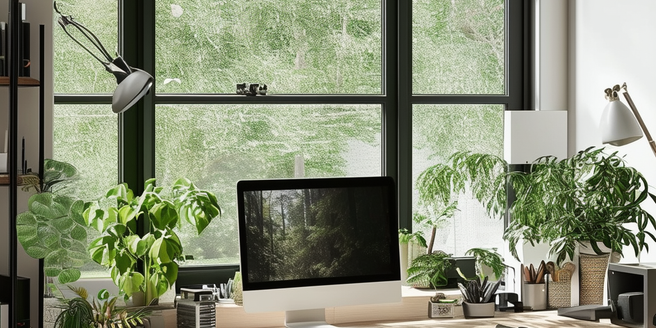Creating a Dedicated Workspace
Creating a dedicated workspace is crucial for effective work-from-home. It helps establish a boundary between home and work life, allowing you to focus more effectively during working hours. Choose a space that minimizes distractions and is well-lit to improve concentration and productivity. An ergonomic setup with a comfortable chair and desk is essential to avoid physical strain. Keep your workspace organized and clutter-free to reduce stress and improve efficiency. Personalize your space with items that inspire you but avoid overly distracting decorations. Having a designated workspace helps signal to others in your household that you are in work mode, setting boundaries that respect your professional time. This separation will help you mentally switch on for work and off at the end of the day, fostering a healthier work-life balance.
Establishing a Daily Routine
Maintaining a daily routine while working from home is essential for productivity and mental well-being. Start by setting a consistent wake-up time and morning routine to simulate a typical workday. Dress in work-appropriate attire to shift your mindset from home to professional. Outline tasks for the day and allocate specific times for work sessions and breaks. Utilize techniques such as time blocking or the Pomodoro Technique to structure your day effectively. Having set start and end work times helps to create a balanced work-life boundary and reduce the risk of overworking. Consistency in your daily routine will support your mental health, allowing you to maintain a sense of normalcy and control despite the flexible nature of remote work.
Managing Distractions Effectively
Managing distractions is one of the most challenging aspects of remote work. It is important to identify common distractions in your environment, like social media, household chores, or family members, and strategize ways to minimize them. Designate specific times for breaks to check your phone or scroll on social media. Use apps or tools to block distracting sites during work hours. Communicate with family or roommates about your work schedule to minimize interruptions. Consider using noise-cancelling headphones or background music to maintain focus. Setting boundaries within your household about your work hours can help ensure that your work time is respected. Practicing self-discipline is key in managing distractions, ensuring that you remain focused and productive throughout the day.
Staying Connected with Colleagues
Staying connected with colleagues while working remotely is vital for collaboration and maintaining team morale. Regular communication through video meetings, messaging apps, or emails can help ensure everyone stays informed and aligned on projects. Schedule virtual coffee breaks or team-building activities to maintain interpersonal relationships and reduce feelings of isolation. Make sure to encourage participation from all team members during these virtual gatherings. Use collaborative tools for project management and file sharing to make coordination smoother. Being proactive in reaching out and setting up regular check-ins can help keep the lines of communication open. Fostering a culture of openness and support encourages sharing of ideas and feedback. Ensuring regular, transparent communication can significantly enhance teamwork and productivity in a remote setting.
Balancing Work and Personal Life
Maintaining a work-life balance when working from home can be challenging but is essential for long-term well-being. Begin by defining your work hours and clearly communicating them to your household to reinforce boundaries. Avoid checking work emails or messages outside of these times. Designate specific areas in your home for work to mentally separate professional tasks from personal life. Prioritize taking breaks to recharge, stepping away from your work setup to refresh your mind. Scheduling time for fitness, hobbies, or socializing is important to ensure you are not consumed by work. Practicing mindfulness or relaxation techniques can help manage stress levels. Balance is key to preventing burnout and maintaining both productivity and personal happiness.



